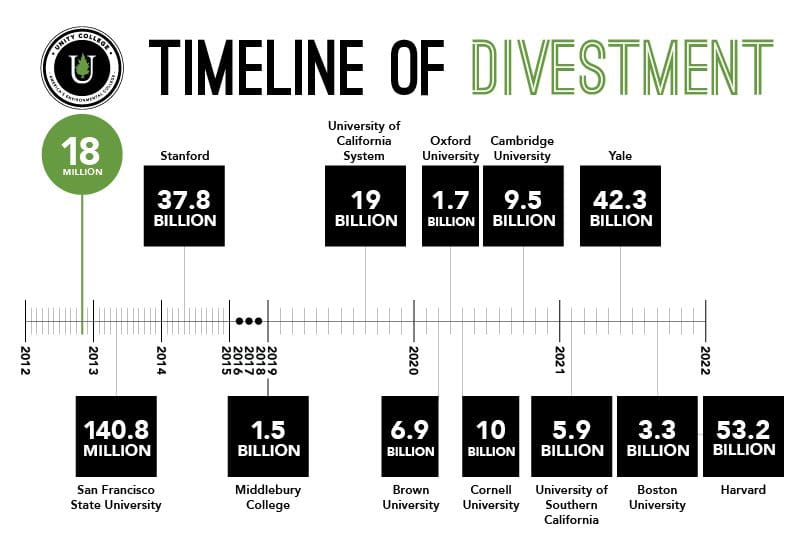
Unity College Celebrates Decade of Divestment

Committed to Growing Our Divested Endowment to Support Student Access
After becoming the first institution of higher education to divest from fossil fuels, Unity College is celebrating a decade of divestment in 2022. Now, the focus at America’s Environmental College is on ensuring more students across the country and around the world are able to access Unity’s world-class environmental science education.
What started out as a trickle has sparked a massive worldwide trend as more institutions follow Unity College’s path to fossil fuel divestment. Since becoming the standard-bearer in 2012, more than 1,500 institutions have divested $40 trillion dollars in assets.

“It has been wonderful over the last 10 years watching other institutions who have struggled with this decision use Unity College as a confidence booster to start this conversation. What Unity College was able to do was provide a proof of concept. We have shown that this path is not only morally correct – it is also fiscally possible,” said Unity College President Dr. Melik Peter Khoury.
Colleges are no longer alone in this decision. Many other industries, including faith-based organizations and governments are getting behind the divestment movement. This includes the state of Maine – which recently became the first state in the nation to divest itself of assets invested in the fossil fuel industry.
“Throughout the country, we’re seeing other young climate activists and adult allies leading efforts to have their colleges and universities divest. Unity College was the first in the nation to do this, showing once again that Maine is a leader in the nation on climate activism and policy. We will continue to lead and build partnerships in the fight to protect our future,” said Rep. Maggie O’Neil, D-Saco, the sponsor of LD 99, the first-in-the-nation bill to divest state assets from the fossil fuel industry.
Bill McKibben, world-renowned environmentalist and co-founder of 350.org, was there the night Unity made a giant leap for the future of fossil fuel divestment.
“Unity got the ball rolling. I will never forget the night that I watched President Mulkey rise to his feet from the audience at the Portland stop of our Do the Math tour and tell the crowd that his trustees had just divested the college from fossil fuels. The crowd went wild, and those of us who had kicked off this drive were over the moon.”
Now, that memory serves as the starting point for what has become a global movement.
Forty trillion dollars later, I can still say that is one of the sweetest moments of the last decade in the climate fight.
Bill McKibben
Unity College President Dr. Melik Peter Khoury champions 350.org as an important ally in the fight against climate change.
“The work that Bill McKibben and 350.org was doing and the passion of Unity College’s President Emeritus Dr. Stephen Mulkey, made it the perfect alignment of forces. Since that day, Unity College has walked the walk of being the first college in the nation to divest its endowment from fossil fuels,” said Dr. Khoury.
That passion still burns deeply with President Emeritus Mulkey, who believes the overarching mission of higher education is the maintenance and renewal of civilization.
“It is morally indefensible that an institution dedicated to the proposition of the renewal of civilization would simultaneously invest in its destruction. Divestment is not optional,” said Dr. Mulkey in a recent interview.
“Dr. Mulkey stepped up when others would not. His work on this subject must never be forgotten,” said President Khoury.
Unity built a successful road map for others to follow, and the college believed “if you build it, they will come.” A sentiment that is now truly being realized as a growing number of large institutions with major endowments have divested from the fossil fuel industry.
“It is becoming the norm, as universities like Harvard, Yale, and Middlebury join the fight and divest their massive endowments from fossil fuels. We tip our caps to them, as we know just how hard the fight can be. It was not easy – we did not get to this point without major pushback,” said Dr. Khoury.

It’s a sentiment echoed by McKibben, who says America’s Environmental College led the way for these larger institutions.
“I cannot tell you how hard it was to win divestment victories at Harvard or Oxford or the hundreds of other schools where students, faculty, and alumni have had to wrestle with administrations over many years. People have gone to jail, gone on hunger strikes, had to occupy buildings. It puts in stark relief the fact that at Unity, which went first, the administration decided to lead. Its officers knew precisely what its community would want, and they did it proactively, just the way every institution should be tackling the climate crisis,” said McKibben.
It’s a battle most easily won when there is support from the top. Unity College Chairman of the Board of Trustees, Sharon Reishus, says it is time trustees take a hard look at their college’s viability long into the future, and act in the best interest of their institution and the world.
“There is no longer room for doubt that human existence is existentially threatened by climate change, and it is up to trustees to demonstrate their long-term commitment to their institutions and to society at large by divesting from fossil fuels now,” said Reishus.
Unity College has shown proof of concept. For ten years, the college’s divested endowment has outperformed key market indexes; growing from $12 million dollars in 2012 to more than $18 million dollars today.
“A decade of experience at Unity has shown that the financial return on your endowment will not be diminished if properly managed, and that concern should not be used as an excuse for delaying the adoption of good governance policies any longer,” said Reishus.
Divestment from fossil fuels is something many of Unity College’s students are quite proud of. Sarah Pitman is studying for her master’s degree in Environmental Science at Unity College, and she believes divesting from fossil fuels is a critical step in driving innovations in sustainable energy production.
“I am proud to be associated with an academic institution that is practicing what they preach and modeling environmentally respectful practices in their daily operations … I believe that every choice, big or small, creates a ripple effect. Choosing to divest from fossil fuels is an act of radical compassion for communities, both close to home and farther afield.” said Pitman.
Now, the focus is on the future and the next decade at Unity College. Just as the institution led the way on divestment, it is now shattering the mold as it provides a clear path to accessibility and affordability.
Over the past few years, the college, under the direction of President Melik Khoury, has created multiple Sustainable Educational Business Unit’s (SEBUs); each designed to meet every student’s individual needs. This improved access has helped America’s Environmental College grow its 50-year diverse student population from 8%, to over 20% in just the past two years, and that number continues to rise. Unity College has also more than quadrupled the number of students it has over a three-year span. As of the winter of 2022, more than 3,000 students are enrolled.
Divestment from fossil fuels is no longer a fringe strategy, and in that same light, environmental science education is no longer a niche education.
Dr. Melik Khoury
“Divestment from fossil fuels is no longer a fringe strategy, and in that same light, environmental science education is no longer a niche education. Mainstreaming both will greatly improve the health of our planet. We must now look at the environmental sciences from every educational tier. From upskilling and workforce development, to certificates, associate, bachelor’s, and master’s degrees; every company should have employees with a basic understanding of the environment and sustainability,” said President Khoury.
Unity College has transformed as an institution focused pedologically on mitigation, to a focus on adaptation. In the coming year, the college will be focused on growing its divested endowment as a means of supporting its students and mission.
“The more that we can grow Unity College’s divested endowment, the more we can dedicate that money to student resources, and the less we will rely on tuition to provide excellent support to those who need it most,” said President Khoury.
Dr. Khoury went on to say “it is important that our donors understand that their investment in Unity College is not only an investment in the college. It is an investment in a more sustainable and equitable planet for all.”
For more information on how you can donate to Unity College’s environmental mission please visit https://unity.edu/give/.






